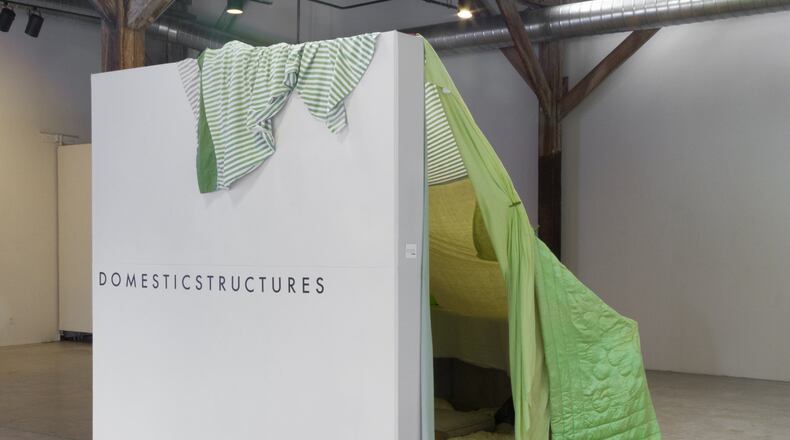Home, as it is understood by female artists, is the crux of Atlanta curator Candice Greathouse's exhibition "Domestic Structures" at the cool Athens alternative art space ATHICA, housed in a warehouse facing railroad tracks on the industrial fringe of town where artist spaces, dance studios and creative companies share close quarters.
Featuring seven artists from Atlanta and Athens, “Domestic Structures” is a spare, subtle show with some nice air time between pieces. That degree of space between work, both physical but also psychological — allowing the mental space to ponder the work — is important, and always appreciated when so many group shows overstock their exhibitions, certain that more work and information equals a more persuasively mounted thesis.
Though far from perfect and a show in need of a hook beyond female musings on the domestic, “Domestic Structures” shows sophisticated intent that falls short of its desire to reanimate what the home means in 21st-century artists’ terms. The exhibition’s stated jumping-off point is the Womanhouse art collective created in the ’70s by feminist artists Judy Chicago and Miriam Shapiro, which imagined home as a place of creativity rather than simply of female confinement in domestic servitude.
There is work that gets at the security and womb-like comforts of home — Meta Gary’s humble, sloppily charming tent fort, for instance. To enter “Fort 5,” viewers shuck their shoes and crawl inside the sheet- and blanket-draped cave, to sit on cushions pulled from vintage sofas and watch a tiny, vintage television featuring “Sesame Street,” home movies, “The NeverEnding Story” and other comforting childhood entertainments. The forts we built in childhood may be our first attempt to create an ideal home of our own, one founded on security and softness, and that evocation may be the sweetest idea in the mix.
On the opposite end of the spectrum for its austere evocation of home is InKyoung Chun’s “Blue Gate,” a steel structure in the iconic shape of a house whose blue neon tubes give a mere semblance of warmth. “Blue Gate” suggests that the idea of home is as basic as a street sign; an empty vessel we fill with our own ideas, comforts, positive and negative connotations. Lauren O’Connor-Korb’s “Gregor’s Anxious Dreams” strikes a similar note of formalist dis-ease: inside a mantel or shelf, an incessantly pinging whirl like a lottery ball forever looping in its basket signals some caged anxiety pent up in the home’s very structure.
A sophisticated evocation of the fragility of home, Elizabeth Lide’s “Dirty Laundry” plays like a collection of archaeological relics. Her vases and pitchers crafted from paper pulp and plaster suggest a myth of home propped up with great effort. Channeling a similar handicraft moment, Jessica Machacek’s “Curtain: Blue Majestic With Ocean Bottom” is a quilt whose cozy, homegrown ambiance is destroyed by its material — vinyl.
There is also work that asserts the domestic as a subject without offering much more by way of insight like the talented photographer Christina Price Washington’s photogram of a “Couch” that turns a familiar object into something slightly eerie. Some of the most enticing work in the show are Brittainy Lauback’s quietly creepy magazine-slick images of vintage offices. Her beige and peach-colored push button telephones and answering machines are relics of another age, a “Mad Men”-era when office work was less a career than a purgatory before marriage. Vases of roses and manicured nails suggest women as the ultimate office appliance. All of the bland, sand-colored office accessories lend a mix of sadness and vapidity to the world depicted that gets under your skin.
IN OTHER NEWS:
ART REVIEW
“Domestic Structures”
Through June 10. 1-9 p.m. Thursdays; 1-6 p.m. Fridays-Sundays. ATHICA, 160 Tracy St., Unit 4, Athens. 706-389-5450, www.athica.org.
Bottom line: Though ambitiously mounted with an array of well-crafted work, this show falls short of its effort to reanimate what home means to 21st-century female artists.
About the Author
Keep Reading
The Latest
Featured





